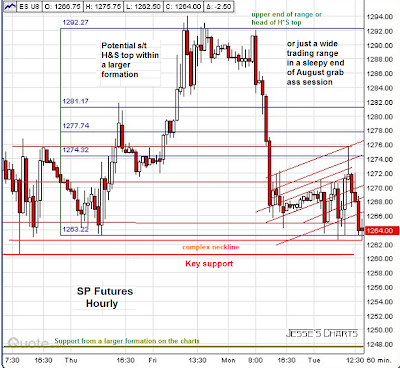Among investment banks, Goldman Sachs has been the Dreadnought, ploughing forward through troubled financial seas, stopping only to take a prize here and there, and deposit executives in key political postions throughout federal and state governments.
Can even the mighty Goldman shake and tremble in the face of troubled markets? We will have to wait and see when they report earnings. We are not betting against or for them. We'll prefer to watch for additional developments, including the NY Attorney General's probe noted below.
Goldman Profit Estimate Cut 45% by Morgan Stanley
By Poppy Trowbridge and Christine Harper
Aug. 27 (Bloomberg) -- Goldman Sachs Group Inc. had its third-quarter earnings estimate cut almost in half by Morgan Stanley analyst Patrick Pinschmidt, who said stock market declines will force the bank to revalue investments.
Pinschmidt said Goldman's third-quarter earnings will probably be $1.65 a share, down from his earlier prediction of $3. The New York-based bank may record a loss of $525 million on so-called principal investments, compared with a gain of $211 million a year earlier, he said in a note to clients today.
Goldman, the biggest and most-profitable U.S. securities firm, had its estimates reduced an average of $1.33 per share by 13 analysts this month because of decreased trading volume and a drop in stock prices. Pinschmidt's estimate is the second-lowest of 19 compiled by Bloomberg behind Atlantic Equities analyst Richard Staite, who lowered his per-share estimate today to $1.60 from $3. The average is $2.44.
``Goldman Sachs is not immune to difficult market conditions,'' Pinschmidt wrote. ``Significant declines in equity markets will take a toll on principal investment marks and principal trading strategies.''
Goldman has declined 28 percent in New York Stock Exchange composite trading this year. The shares fell $1.46, or 0.9 percent, to $153.73 at 9:53 a.m.
Principal investments at Goldman include private equity and real estate holdings, as well as stock in the Industrial and Commercial Bank of China Ltd., the nation's biggest lender. ICBC's shares have declined 18 percent since the end of May in Shanghai trading.
Record Decline
Pinschmidt's estimate for Goldman's third quarter, which ends Aug. 29, would represent a 73 percent drop in earnings per share compared with the firm's income of $6.13 a year earlier. That would be the steepest year-over-year earnings decline since Goldman went public in 1999. Pinschmidt rates Goldman stock ``over-weight.''
Lower values for residential and commercial mortgages are likely to require Goldman to take a $1 billion writedown, Pinschmidt said...
NY AG confirms probe into Goldman, Fidelity
Wednesday August 27, 1:10 pm ET
By Joe Bel Bruno
NEW YORK (AP) -- The New York attorney general's office said Wednesday it is investigating whether Fidelity Investments was given incentives by Goldman Sachs Group Inc. to sell auction-rate securities to investors.
Investigators are examining if Fidelity pitched auction-rate securities that were underwritten by Goldman Sachs because it received other services from the investment bank. A spokesman for New York Attorney General Andrew Cuomo confirmed the investigation, but declined to provide further details.






























